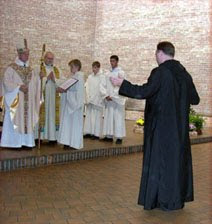 When a man or a woman answers the call to live the monastic life that is the first step is a life long process of living out that call. Part of the journey is the taking of vows. The monk makes four vows those of poverty, chastity, obedience, and stability. Theses are commonly known as the Evangelical Councils. In this series of articles I will look at each of the vows and the meaning behind each of them.
When a man or a woman answers the call to live the monastic life that is the first step is a life long process of living out that call. Part of the journey is the taking of vows. The monk makes four vows those of poverty, chastity, obedience, and stability. Theses are commonly known as the Evangelical Councils. In this series of articles I will look at each of the vows and the meaning behind each of them.
The vows that a monks takes either eastern or western are not as old as monasticism itself. In the early years, a person would find an elder and then dress in monastic garb. This garb would have been different depending not only on the elder but also the geographic location. Vows came along about the 6th century and have been used since then both in the Eastern Church and the Western Church.
These vows are public and in them they confirm the profession of the vows I have outlined above. In the Western Church, Benedictines are the only ones who make the fourth vows of stability but in the Eastern Church all Monastics take this vow.
Just a word on Religious Orders. Orders grew from the elder monk relationship into much larger world wide organizations of Monastics. One thinks of Benedictines, Dominicans, Franciscans, Jesuits, etc. In the Eastern Church Orders do not exist per se rather monasteries exist under an Igumen and follow a rule or Typicon that is common to that particular monastery. Most typicons would be basically the same with some regional variation.
 Poverty is one of the lest understood vows that a monastic takes. Poverty in a monastic sense is that of individual poverty. Everything is owned in common by the community and no one has more than one needs. The monastic community will own the land and buildings and such as well as all of the other possessions of the monastery. This will differ from monastery to monastery. Cistercians of the Strict Observance, commonly known as Trappist do not even own the clothes on their backs, all is owned in common.
Poverty is one of the lest understood vows that a monastic takes. Poverty in a monastic sense is that of individual poverty. Everything is owned in common by the community and no one has more than one needs. The monastic community will own the land and buildings and such as well as all of the other possessions of the monastery. This will differ from monastery to monastery. Cistercians of the Strict Observance, commonly known as Trappist do not even own the clothes on their backs, all is owned in common.
“Now all who believed were together, and had all things in common, and sold their possessions and goods and divided them among all, as anyone had need.” Acts 2:44
This is a very difficult concept in out 21st Century materialist world that we would literally sell all we have and give to one another but that is exactly what the monastic vows.
“Will you remain unto death in non-acquisitiveness and in the voluntary poverty for Christ’s sake which belong to the common life; not acquiring or keeping anything for yourself except in accordance with common necessity, and then, only in obedience and for your own discretion?” (Monastic Tonsure Service)
The monastic has to figure out for themselves the difference between a need and a want. The Monastics will also practice recycling to find other uses for items that are no longer in use. Sometimes a broken item and be put to use as something else thus saving the need to acquire another item.
The community should not acquire things that are not necessary as well. Sometimes one goes to a monastery and the monks are living like kings. This is not a good idea. Live a simple life is the watch word in the monastery. The main thing to remember about monastic life is that for the most part it is lived out in community and not solitary. The community is one that decides what is good for the community not the individual. However, account is taken that some may be weak and will require more than others.
Next time Chastity

Could you comment later in the series on why these are known as the "Evangelical Counsels"?